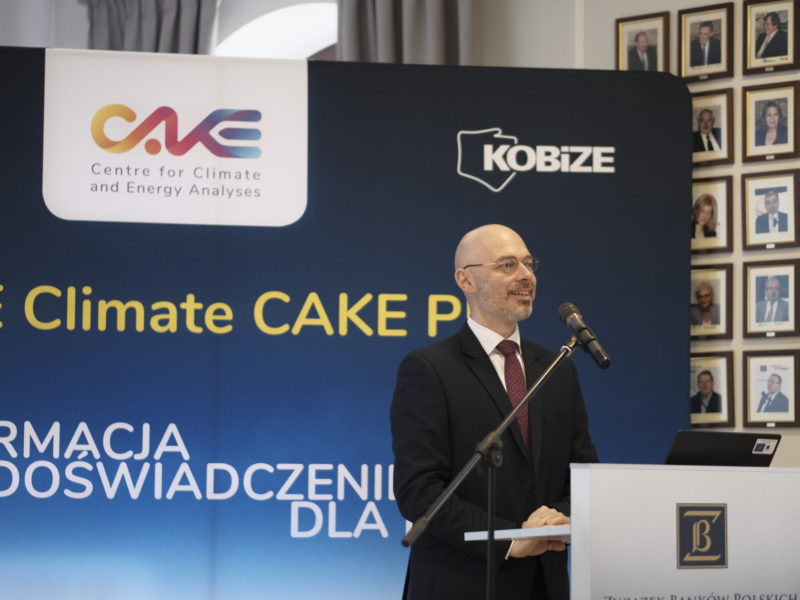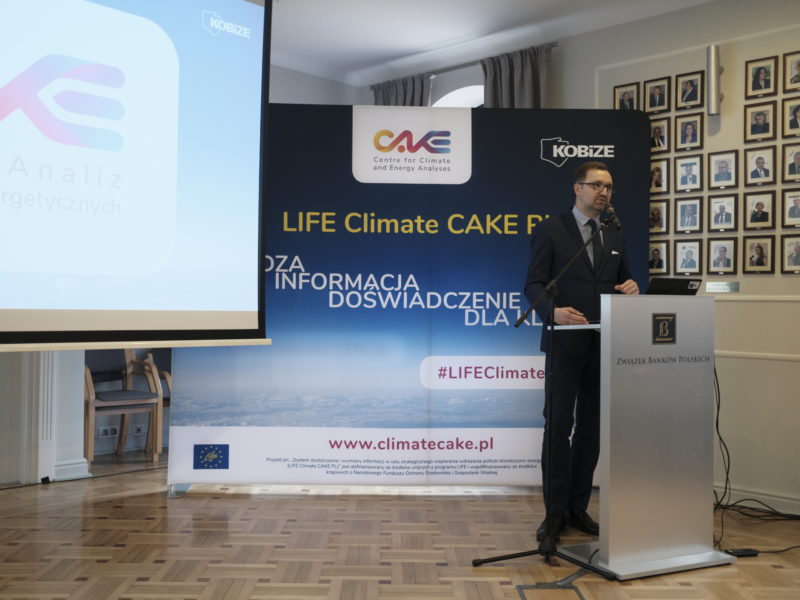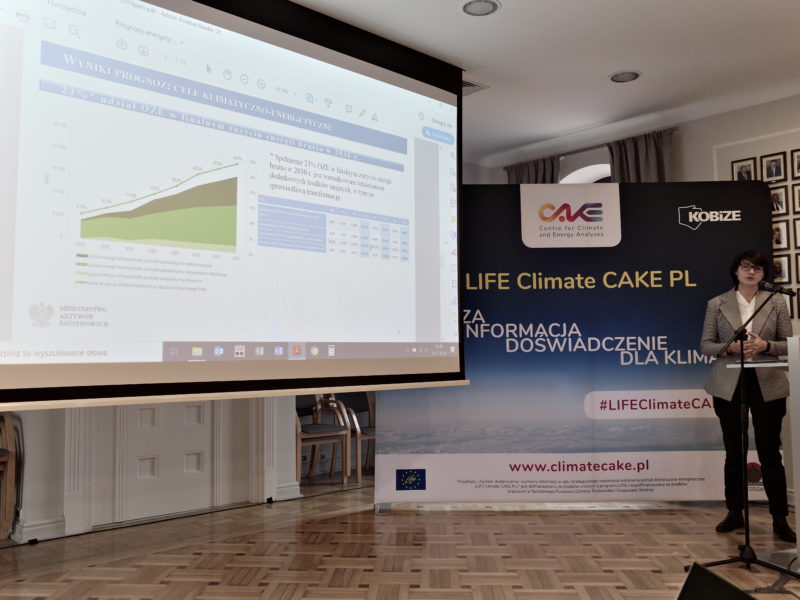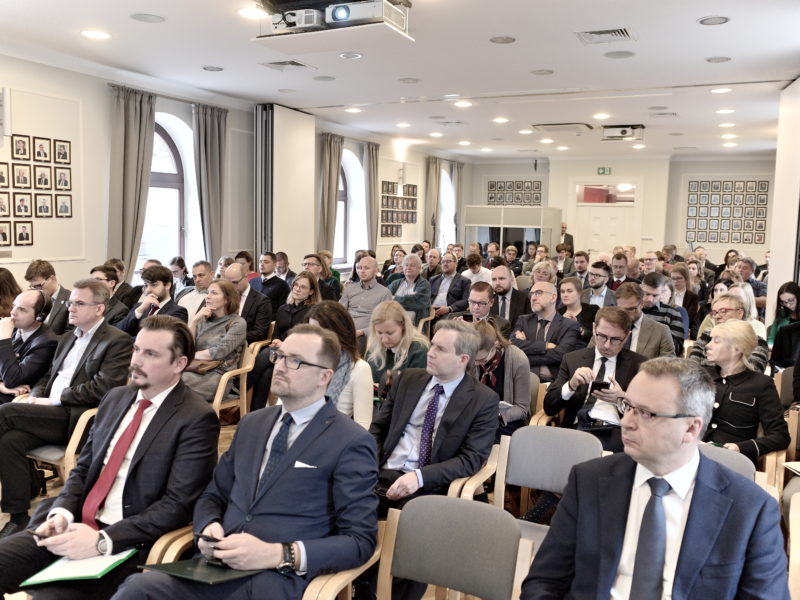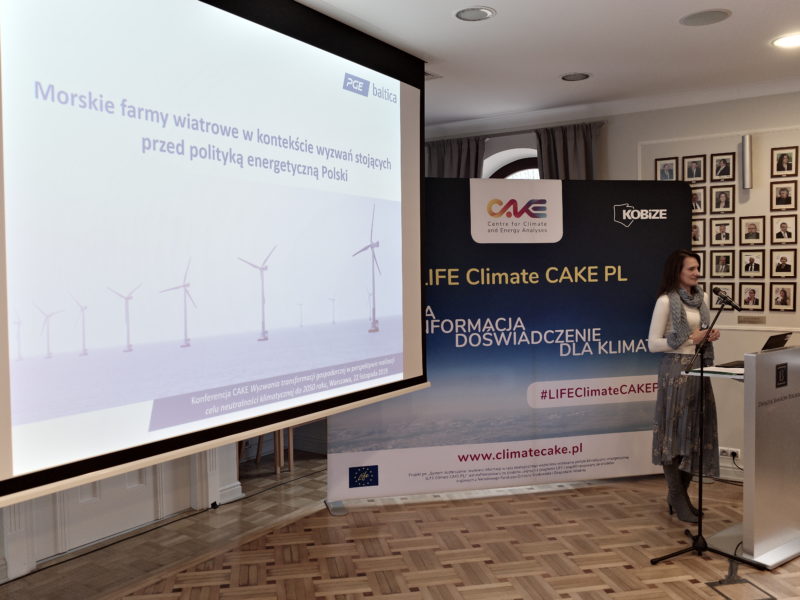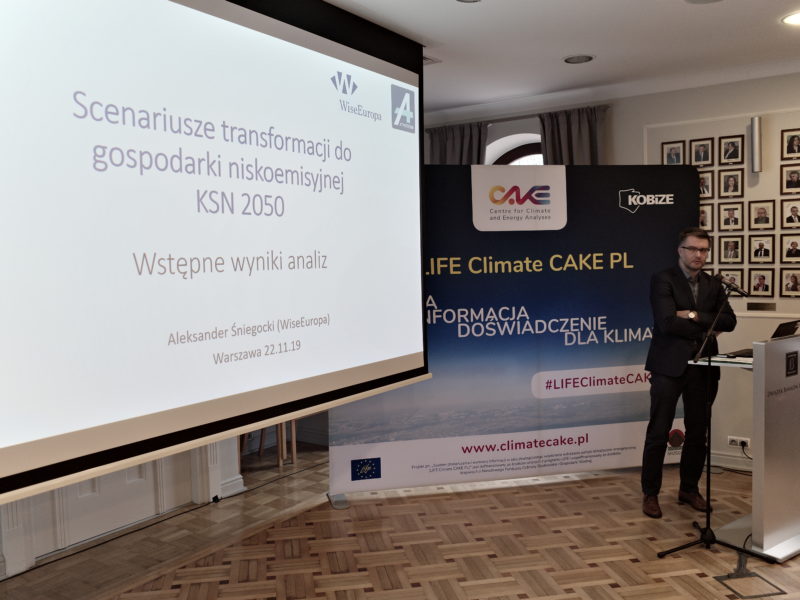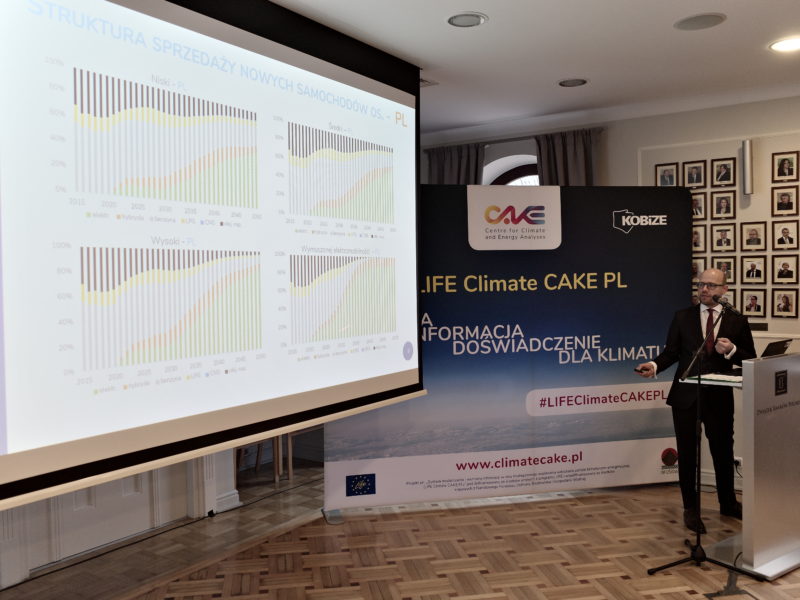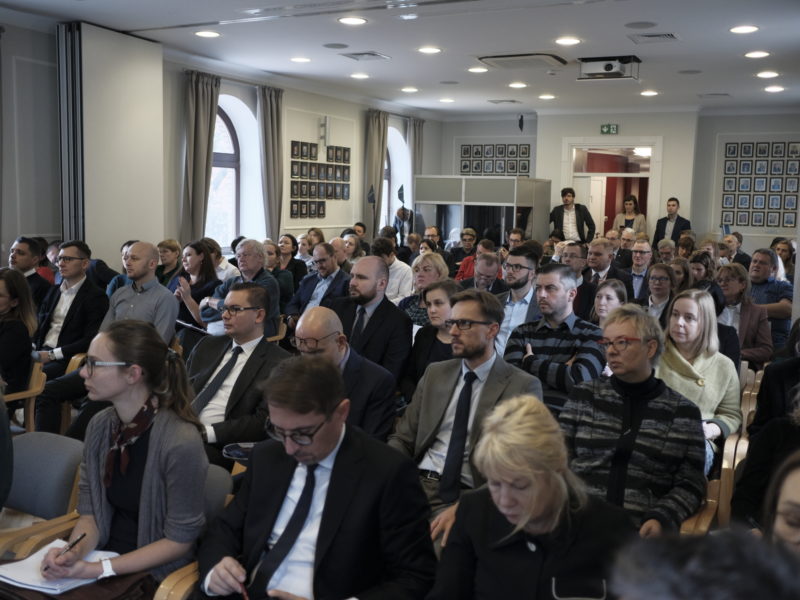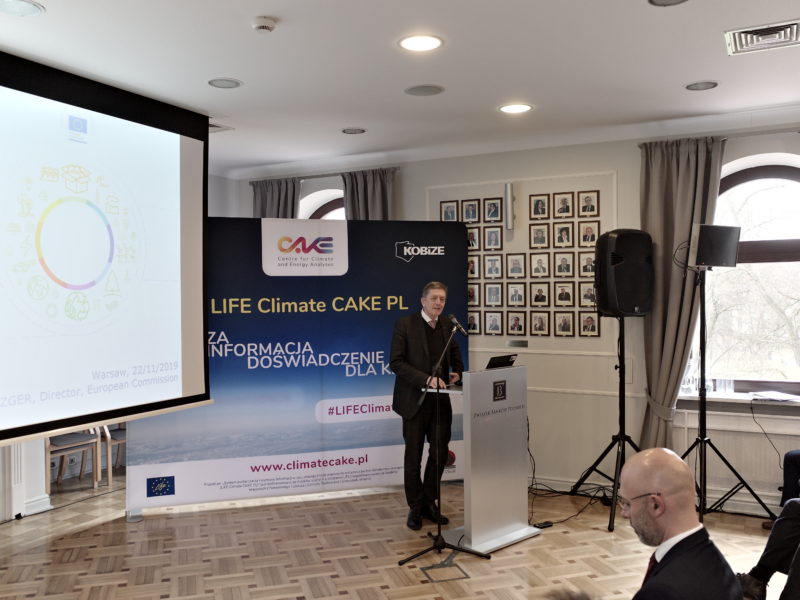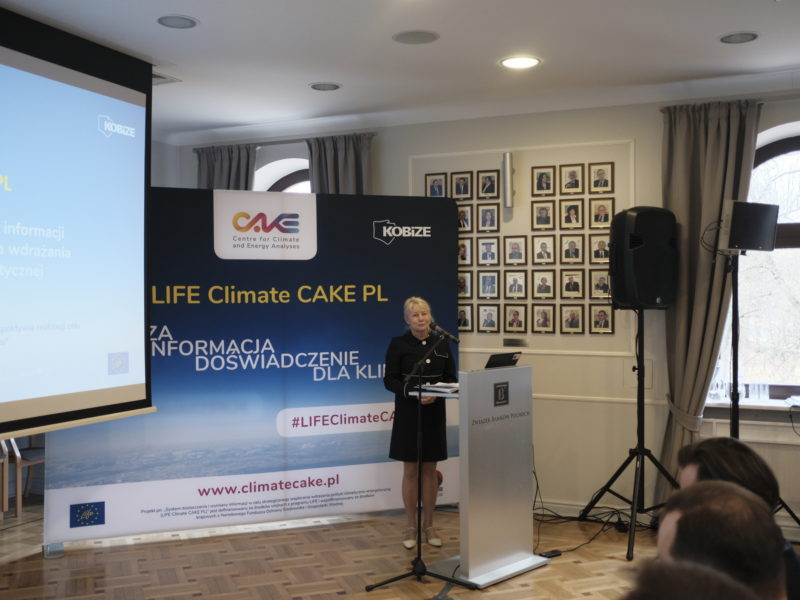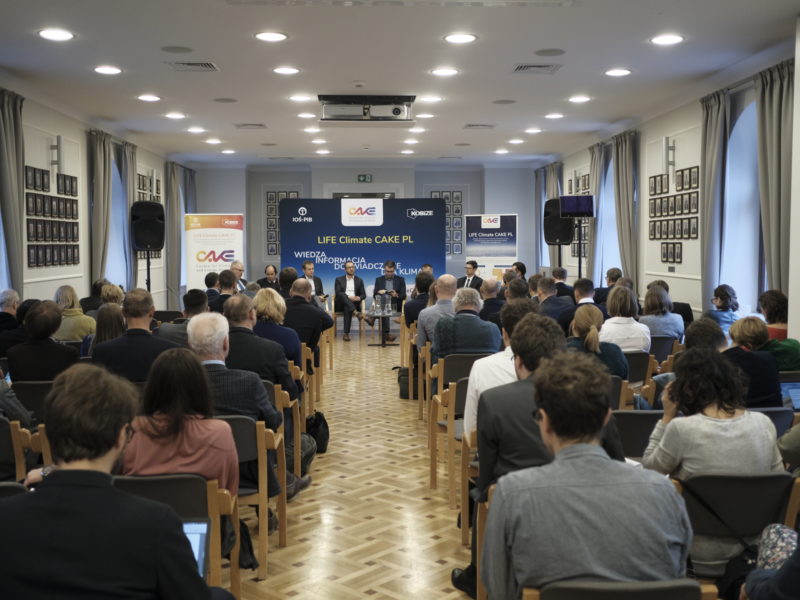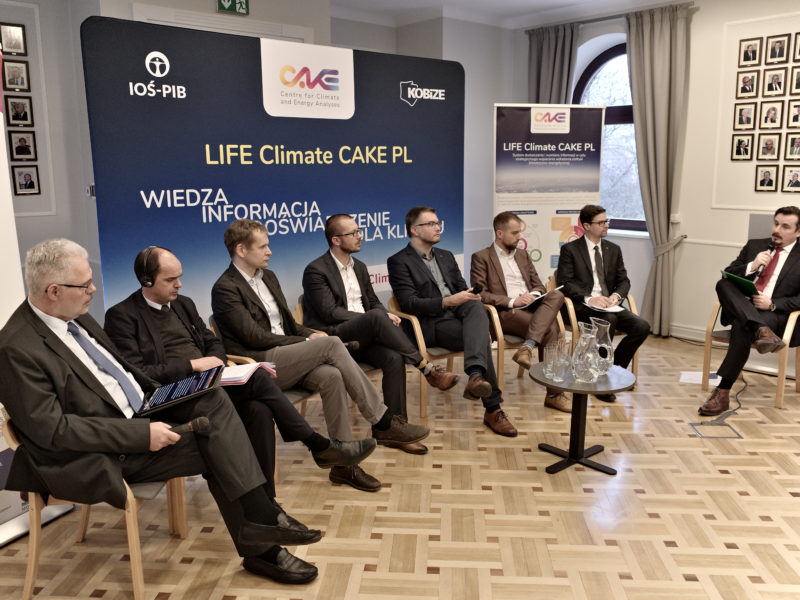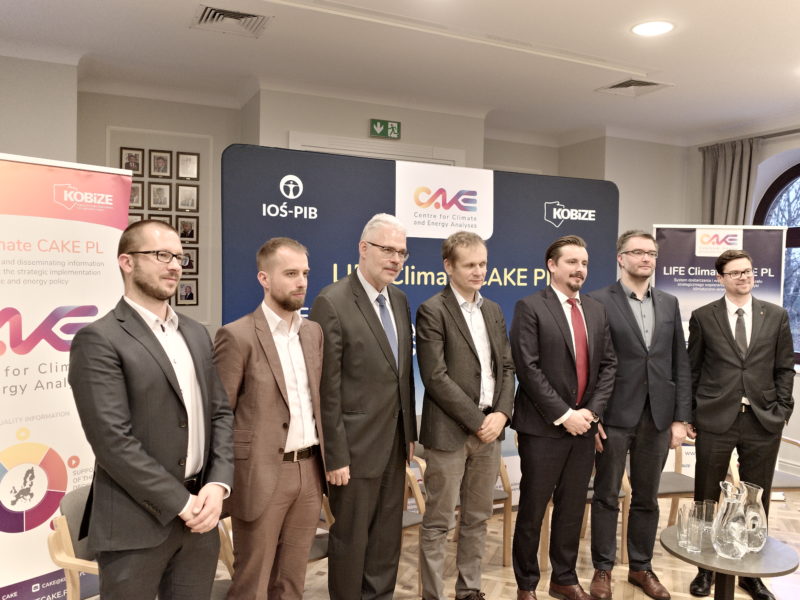Summary of the conference and discussion panel entitled “Challenges of the economic transformation in the perspective of achieving climate neutrality by 2050” – 22 November 2019, Warsaw
- Summary of the conference entitled “Challenges of the economic transformation in the perspective of achieving climate neutrality by 2050”
Mr. Robert Jeszke (LIFE Climate CAKE PL Project Coordinator, KOBiZE, IOŚ-PIB) officially started the conference, welcomed all participants and invited guests to give introductory speeches.
Mr. Michał Kurtyka (Minister of Climate) he welcomed the guests and presented the challenges facing Poland and the need for economic transformation. In his speech he emphasized “that there is no equal recipe for climate neutrality for everyone, and the scale of the challenge will differ for individual EU countries and will be more difficult for countries with the lower GDP levels.” In this context, he pointed out the need to incur significant investments related to the transition to a low-carbon economy. The minister emphasized that the work carried out under CAKE and analytical tools developed under LIFE Climate CAKE PL, which match the quality of the European Commission tools, are of great importance for substantive discussion on climate neutrality. Poland shows how high the importance of fighting climate change is, including by establishing the Ministry of Climate. It is essential that Europe becomes the first climate neutral continent.
Mr. Artur Runge-Metzger (DG Clima Director responsible for Strategies, Climate Management and Emissions from non-ETS sectors) positively emphasized Poland’s use of funding opportunities and obtaining support through LIFE projects. He stressed that it is positive to build an own analytical workshop and opportunities in Poland, while the challenges facing the Polish efforts towards achieving the goal of climate neutrality. He emphasized Poland’s work to date to include emissions in the emissions accounting process. He emphasized that the transformation will require investment in Poland, but at the same time they will bring positive elements for the economy, he emphasized that a fair transformation must be part of it and he emphasized the role of the EIB bank in financing economic transformation.
Presentation:  EU Climate Policy_European-Commission_22.11.2019 (1.6 MiB, 620 hits)
EU Climate Policy_European-Commission_22.11.2019 (1.6 MiB, 620 hits)
Mr. Sławomir Mazurek (Undersecretary of State for the Environment) he emphasized that he is proud of the implementation of projects such as CAKE from the EU funds LIFE program, as support for the decision-making process is crucial in determining the appropriate course of action. He emphasized that the LIFE Climate CAKE PL project creates tools for in-depth impact analysis at the national level, and at the same time uses an approach in which the construction of analytical tools and scientific research is combined with the activities of the state administration as the main recipient of the project’s effects. The project’s objectives are in line with supporting the implementation of the EU’s climate change policy, in particular supporting the implementation of the 2020 energy and climate package and the EU climate policy framework until 2030, also in the perspective of the long-term strategy until 2050.
Mr. Krystian Szczepański (IOŚ-PIB Director) he emphasized that it is important to continue working to build human and financial potential and the reputation of IOŚ-PIB on the international stage. Independently he stressed that the huge challenge is the constant building of IT and analytical tools in the field of environmental protection. He informed about the work being carried out by the Institute on the construction of the National Waste Base.
Mrs. Grażyna Hadjiraftis (NFOŚiGW) presented information on the role and activities of the NFOŚiGW in cooperation with the European Commission, referring to various programs and projects. She informed about the method of applying for financial resources to the European Commission and at the same time informed that obtaining these funds is the evidence of the high level of the LIFE Climate CAKE PL project.
Mr. Robert Jeszke (Koordynator projektu LIFE Climate CAKE PL, KOBiZE, IOŚ-PIB) gave a short presentation about the project – its goals, how to raise funds and the need to build appropriate expert facilities in the form of the LIFE Climate CAKE PL Team. He reported that the CGEE models of general equilibrium CGE, energy MESSA and transport TR3E allowed for the preparation of the first analyzes and results concerning the future and the possibility of achieving the goal of climate neutrality. He emphasized that the appropriate tools built as part of the LIFE Climate CAKE project allow to analyse climate policy and, as a result, allow the policy makers to properly assess the situation. He also informed that the last model of the Polish agricultural sector EPICA – is currently in progress.
Presentation:  LIFE Climate CAKE PL_22.11.2019 r. (1.7 MiB, 633 hits)
LIFE Climate CAKE PL_22.11.2019 r. (1.7 MiB, 633 hits)
Mr. Igor Tatarewicz (LIFE Climate CAKE PL Expert) presented the results of the analysis prepared as part of the LIFE Climate CAKE PL project entitled “Scenarios of low-emission energy sector for Poland and the EU until 2050”, which was prepared on the basis of the linear optimization model built under LIFE Climate CAKE PL called MEESA. Based on the established assumption of maintaining a policy focused on systematic reduction of CO2 emissions and an increase in the share of Renewable energy, four scenarios of the low-emission EU electricity and district heating sector was analyzed. According to analyzes, brown coal use is rapidly decreasing in all scenarios for Poland in 2025-2030. This is due to rising CO2 prices, the availability of imported energy and the depletion of currently exploited coal deposits (launching new open-pit mines would require significant financial outlays). Wind farms are developing dynamically, the use of photovoltaic sources is growing, while the development of electricity production from biomass is limited. More information in the analysis (link)
Presentation:  LIFE Climate CAKE PL_MEESA_Scenarios for the low-carbon energy sector in Poland and the EU until 2050_22.11.2019_EN (765.6 KiB, 369 hits)
LIFE Climate CAKE PL_MEESA_Scenarios for the low-carbon energy sector in Poland and the EU until 2050_22.11.2019_EN (765.6 KiB, 369 hits)
Mr. Jan Gąska (LIFE Climate CAKE PL Expert) presented the results of the analysis prepared as part of the LIFE Climate CAKE PL project entitled “CO2 emissions reduction potential in transport sector in Poland and the EU until 2050”, which was prepared based on the simulation model of partial balance of the transport sector – TR3E. The analysis attempted to present different paths of emission reduction in the transport sector in Poland and the EU in the perspective of 2050. The analysis prepared four different analytical scenarios to assess the possible impact of the development of new technologies or regulatory enforcement in the transport sector on the sector’s activity (the activity in passenger transport and freight), CO2 emissions and energy demand as well as the structure of the vehicle fleet. More information in the analysis (link)
Presentation: LIFE Climate CAKE PL_ CO2 Emissions reduction potential in transport sector in PL and in the EU until 2050_22.11.2019_EN (893.4 KiB, 391 hits)
LIFE Climate CAKE PL_ CO2 Emissions reduction potential in transport sector in PL and in the EU until 2050_22.11.2019_EN (893.4 KiB, 391 hits)
Mrs. Monika Morawiecka (Chairman of the Board, PGE Baltika) gave a presentation on the challenges of the Polish energy sector and renewable energy development perspectives, in particular offshore wind farms. In her speech, she emphasized that it is important to have analytical models that will make it possible to test new analysis scenarios that are prepared on the basis of reliable assumptions. Among the mentioned sources of renewable energy sources, she emphasized the role of offshore wind farms which provide the greatest benefits, i.e. they are already competitive (in price) and at the same time do not generate social conflicts.
Presentation:  Morskie-farmy-wiatrowe-w-kontekście-wyzwań-stojących-przed-polityką-energetyczną-Polski (1.1 MiB, 570 hits)
Morskie-farmy-wiatrowe-w-kontekście-wyzwań-stojących-przed-polityką-energetyczną-Polski (1.1 MiB, 570 hits)
Mr. Jan Staniłko (Department of Innovation, Ministry of Development) oraz Pan Aleksander Śniegocki (WISE Europe) gave a presentation entitled “Scenarios for transformation to the low-carbon economy KSN 2050”, where preliminary results of analyzes regarding the low-carbon strategy for Poland until 2050 were shown. One of the main interesting elements was to emphasize the role of political and behavioral restrictions, which are difficult to include in the model.
Mrs. Anna Madyniak (Ministry of State Assets) presented the assumptions and results of forecasts for the National Plan for Energy and Climate and the Energy Policy until 2040 (the forecasts were preapred by ARE). She informed about the adopted assumptions and about the basic purpose of the forecasts, which was to indicate the path of development of the energy sector and Polands contribution to the energy union targets for 2030.
Presentation:  Prognozy energetyczne_KPEiK i PEP_22-11-2019 (2.4 MiB, 1,419 hits)
Prognozy energetyczne_KPEiK i PEP_22-11-2019 (2.4 MiB, 1,419 hits)
- Summary of the conference discussion panel entitled “Challenges of the economic transformation in the perspective of achieving climate neutrality by 2050”
The panel was led by Robert Jeszke (LIFE Climate CAKE PL project Coordinator, KOBiZE, IOŚ-PIB), who in turn asked questions to the speakers and moderated the discussion.
Mr. Piotr Szymański (JRC, European Commission) emphasized and appreciated cooperation with the LIFE Climate CAKE PL and KOBiZE project team in the field of modeling. He informed that an important role in the field of transformation plays the SET – Plan and the cooperation between governments-industry-scientists which aim is to develope a road map for the development of low-carbon technologies. Referring to the work carried out on the models, he informed that work is currently underway on the POTENCIA model (an internal commission tool, by definition perfectly transparent), by among others experts, KOBiZE and the Ministry of the Environment also take part. He also referred to the problem of air pollution and the impact of decarbonisation on improving the lives of citizens. In this respect, he noted the possibility of joining the work on the definition of the scope of research – Horizon Europe, where the head of the section on Smart and Climate Friendly Cities – is Mrs. H. Gronkiewicz – Waltz.
Mr. Tom Van Ierland (DG Clima, European Commission) emphasized the important role of the LIFE Climate CAKE PL project and modeling itself, which has a specific role to play in providing relevant results and data. This information is intended to help decision makers make the right decisions. In this context, model tools development requires investments in the long term (including model tools developed as part of the LIFE Climate CAKE PL project). He also noted that thanks to the model results, it is possible to consult EU Member States on specific numerical results. Referring to the future of work undertaken in the EU, he stressed that the New Green Deal will be an important subject for the new EC, and the decision on climate neutrality will probably be adopted as early as December this year.
Mr. Maciej Bukowski (WISE Europa) presented that in the context of the challenges of economic transformation, it is important to think about the economy in the long term, which results directly from the actions taken by the EC. He emphasized that in Poland for a long time the focus was on the short term, but the implementation of climate neutrality plans will require action in the long term. In this context, he emphasized that neutrality in 2050 requires intermediate goals in order not to lead to a similar situation as in the implementation of renewable energy targets for 2020. In relation to the implementation of greenhouse gas emission reduction goals, he emphasized the need to start investments in low-carbon technologies, e.g. in energy or transport. In this context, 2030 goals should be set so that the 2050 goals can be achieved. Finally, he added that at the moment Poland will face many strategic challenges and decisions in the field of climate policy. Therefore, the established Ministry of Climate should be adequately provided with financial resources and human resources.
Mr. Paweł Różycki (Department of Air and Climate Protection, Ministry of Climate) presented the challenges facing the EU ETS. According to the speaker, the negative aspects related to the functioning of the system is, among others, limited sector coverage, which means that as GHG’s reduction ambitions increase, the role of this system decreases. In the context of financing needs related to transformation, he said that it is difficult to assess whether the funds available from the sale of allowances under the EU ETS will be sufficient for the necessary transformation of sectors, because as the results of model calculations the costs can be huge and most of them would be bear before 2030. He stressed the role of fair transformation and the need to protect energy-intensive industries. Finally, he said that they were accelerating work on how to spend the resources of the modernization fund (part of the available funds will be allocated to energy, and part to improve energy efficiency in transport, construction, industry).
Mr. Jan Staniłko (Department of Innovation, Ministry of Development) emphasized the importance of the influence of the positions of states on the design of common policies, e.g. energy and climate. This is evident in the approach to nuclear energy, where most countries invest funds in R&D, but due to political views, Europe may lag behind other countries (Japan, USA). He also informed that the green growth policy is becoming oppressive towards those countries that may have problems with its implementation, e.g. due to the high share of coal in the fuel mix. He submitted that in the case of electromobility significant financial outlays are needed, but the funds are much easier to spend on modernizing the energy network or thermo-modernization than on the development of rail transport. Finally, he emphasized that trade policy is the only way to put pressure on the rest of the world, while the rest of the world must also participate in emission reductions like the EU, so that the European economy can remain competitive.
Mr. Maciej Mazur (AVERE – European Association for Electromobility) emphasized the important role of the transport sector in the problem of decarbonisation. He reported that electric vehicles are noiseless and less emissive, but on the other hand they do not allow for the reduction of total emissions unless there is decarbonisation of the power generation sector and the entire automotive parts supply chain. He reported that the main problem is the share of the oldest cars in the car fleet in Poland and a small increase in the purchase of new cars. He noted that at this moment there is no way to effectively fight the most emissive cars, because although emission standards are getting stricter, the number of electric cars is still low.
Mr. Tobiasz Adamczewski (WWF) emphasized the role of civil society in shaping ecological awareness. He presented the results of public opinion polls: the public is aware of the threat and is not negative about climate policy, and according to the results of research according to 64% of respondents see the problem of climate change. He also informed that WWF organized the campaigns “I am a dying species” and “eco-patriots”. Regarding the discussion of challenges, he said that WWF will fight for a clear declaration of neutrality in 2050.
Mr. Robert Jeszke (LIFE Climate CAKE PL Project Coordinator, KOBiZE, IOŚ-PIB) at the end of the conference thanked all participants of the discussion and stressed that in order to achieve decarbonisation of the economy we must set a common path in the EU and take specific decisions.
- LIFE Climate CAKE PL Team

 Reset ustawień
Reset ustawień Kontrast
Kontrast Widok
Widok Czytelność
Czytelność Czcionka
Czcionka Znaki
Znaki Interlinia
Interlinia Słowa
Słowa Akapity
Akapity Deklaracja dostępności
Deklaracja dostępności




